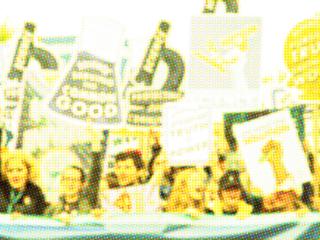Isaac Newton wrote more than a million words on alchemy over his lifetime, conducting decades of alchemical experiments. But he did it all in secret. Why? The question fascinates historian Bill Newman.More
Politics and History
Writer, classicist, and stand-up comic Natalie Haynes makes a strong case for reading ancient Greek and Roman literature in the modern age.More
Anne Helen Petersen has been writing about burnout long before the pandemic. Now she says we’re really starting to run on empty.More
Philosopher Lars Svendson thinks we shouldn't be stressing about learning to bake sourdough or memorize TikTok dances in quarantine. He thinks we need to learn to be lazy again.More
Historian Marcia Chatelain found a surprising connection between McDonald's and civil rights history when researching her book "Franchise: The Golden Arches in Black America." She writes about the intersection of race, capitalism and fast food.More
Farmer Leah Penniman, co-director of Soul Fire Farm in New York state, and author of "Farming While Black," is digging deep into the soil and her African history to change the story for a new generation.More
The promise of 40 acres and a mule didn't materialize for most Black Americans. But attorney Savi Horne, executive director of the Land Loss Prevention Project, is fighting for Black farmers to get their land back, now.More
Ancient humans lived as hunter-gatherers, with animistic religions. So why did people start to believe in Big Gods? University of British Columbia psychologist Ara Norenzayan has a theory. More
One of the first assumptions we make about a relationship is that it begins with sexual attraction. But what about desire without sex? Angela Chen explores the contradictions — and the possibilities — of asexuality in her new book.More
Alexander Rose tells Anne Strainchamps about the Clock of the Long Now — an all mechanical clock being constructed in the high desert of Western Texas designed to run for ten thousand years.More
Lynne Segal, the British feminist icon, has a theory about happiness: it's both personal and political. She advocates radical happiness — finding joy in collective action.More
Social scientists are finding that generating happiness in your life may have less to do with an arbitrary number — like your bank account or how many Instagram followers you have — and more to do with how well you connect with the people around you.More
Kathryn Bond Stockton is an English professor and queer theorist and a self-professed lover of kissing. She wrote a whole book just to make out what kissing means in our lives.More
Archeologist Eric Cline says a "perfect storm" of calamities led to the collapse of the Late Bronze Age. He points out that we face many of the same challenges today.More
Historian Jo Paoletti speaks with Shannon about gender's ever-changing relationship with fashion.More
Renowned classicist Mary Beard says we have lots to learn from Ancient Rome, including insights into how empires rise and fall.More
Avery Trufelman hosts "Articles of Interest," a six-part podcast from "99 Percent Invisible" about some iconic items of clothing — from blue jeans to Hawaiian shirts to pockets. Anne wanted to know how that work connects to what she wears every day.More
In 1914, over the week leading up to Christmas day, the opposing troops sang carols to each other, played ball and exchanged gifts, in spite of their generals’ wishes. Historian Stanley Weintraub says that the Christmas Truce was a one-time-only event.More


















